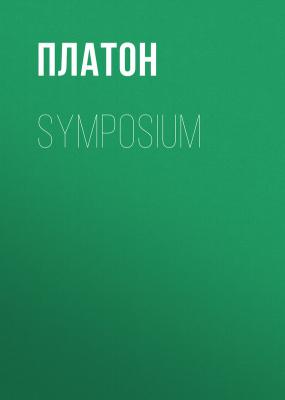Symposium. Платон
Читать онлайн.The last of the six discourses begins with a short argument which overthrows not only Agathon but all the preceding speakers by the help of a distinction which has escaped them. Extravagant praises have been ascribed to Love as the author of every good; no sort of encomium was too high for him, whether deserved and true or not. But Socrates has no talent for speaking anything but the truth, and if he is to speak the truth of Love he must honestly confess that he is not a good at all: for love is of the good, and no man can desire that which he has. This piece of dialectics is ascribed to Diotima, who has already urged upon Socrates the argument which he urges against Agathon. That the distinction is a fallacy is obvious; it is almost acknowledged to be so by Socrates himself. For he who has beauty or good may desire more of them; and he who has beauty or good in himself may desire beauty and good in others. The fallacy seems to arise out of a confusion between the abstract ideas of good and beauty, which do not admit of degrees, and their partial realization in individuals.
But Diotima, the prophetess of Mantineia, whose sacred and superhuman character raises her above the ordinary proprieties of women, has taught Socrates far more than this about the art and mystery of love. She has taught him that love is another aspect of philosophy. The same want in the human soul which is satisfied in the vulgar by the procreation of children, may become the highest aspiration of intellectual desire. As the Christian might speak of hungering and thirsting after righteousness; or of divine loves under the figure of human (compare Eph. 'This is a great mystery, but I speak concerning Christ and the church'); as the mediaeval saint might speak of the 'fruitio Dei;' as Dante saw all things contained in his love of Beatrice, so Plato would have us absorb all other loves and desires in the love of knowledge. Here is the beginning of Neoplatonism, or rather, perhaps, a proof (of which there are many) that the so-called mysticism of the East was not strange to the Greek of the fifth century before Christ. The first tumult of the affections was not wholly subdued; there were longings of a creature moving about in worlds not realized, which no art could satisfy. To most men reason and passion appear to be antagonistic both in idea and fact. The union of the greatest comprehension of knowledge and the burning intensity of love is a contradiction in nature, which may have existed in a far-off primeval age in the mind of some Hebrew prophet or other Eastern sage, but has now become an imagination only. Yet this 'passion of the reason' is the theme of the Symposium of Plato. And as there is no impossibility in supposing that 'one king, or son of a king, may be a philosopher,' so also there is a probability that there may be some few – perhaps one or two in a whole generation – in whom the light of truth may not lack the warmth of desire. And if there be such natures, no one will be disposed to deny that 'from them flow most of the benefits of individuals and states;' and even from imperfect combinations of the two elements in teachers or statesmen great good may often arise.
Yet there is a higher region in which love is not only felt, but satisfied, in the perfect beauty of eternal knowledge, beginning with the beauty of earthly things, and at last reaching a beauty in which all existence is seen to be harmonious and one. The limited affection is enlarged, and enabled to behold the ideal of all things. And here the highest summit which is reached in the Symposium is seen also to be the highest summit which is attained in the Republic, but approached from another side; and there is 'a way upwards and downwards,' which is the same and not the same in both. The ideal beauty of the one is the ideal good of the other; regarded not with the eye of knowledge, but of faith and desire; and they are respectively the source of beauty and the source of good in all other things. And by the steps of a 'ladder reaching to heaven' we pass from images of visible beauty (Greek), and from the hypotheses of the Mathematical sciences, which are not yet based upon the idea of good, through the concrete to the abstract, and, by different paths arriving, behold the vision of the eternal (compare Symp. (Greek) Republic (Greek) also Phaedrus). Under one aspect 'the idea is love'; under another, 'truth.' In both the lover of wisdom is the 'spectator of all time and of all existence.' This is a 'mystery' in which Plato also obscurely intimates the union of the spiritual and fleshly, the interpenetration of the moral and intellectual faculties.
Конец ознакомительного фрагмента.
Текст предоставлен ООО «ЛитРес».
Прочитайте эту книгу целиком, купив полную легальную версию на ЛитРес.
Безопасно оплатить книгу можно банковской картой Visa, MasterCard, Maestro, со счета мобильного телефона, с платежного терминала, в салоне МТС или Связной, через PayPal, WebMoney, Яндекс.Деньги, QIWI Кошелек, бонусными картами или другим удобным Вам способом.
